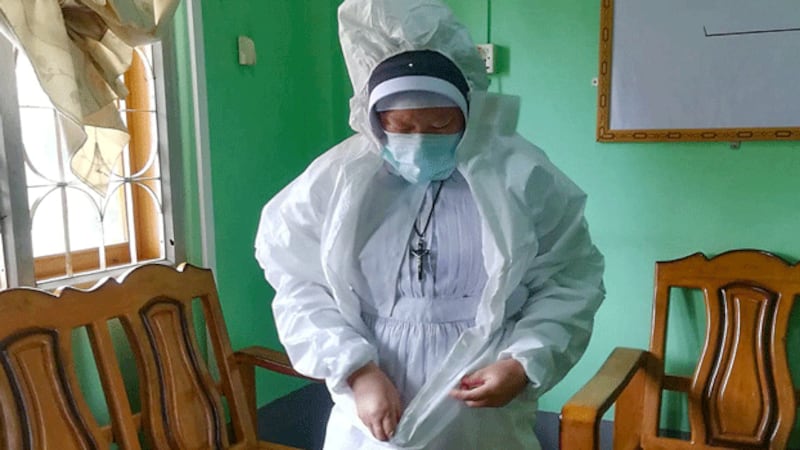A Catholic nun who stood between Myanmar security forces and peaceful protesters, pleading with troops not to open fire on the anti-junta crowd, is now helping coronavirus patients — under regime scrutiny in the wake of the fame her act of defiance won in her predominantly Buddhist country and around the world.
In early March, a month after the army overthrew the country’s elected civilian government in a coup that sent millions of protesters into the streets, Sister Ann Rose Nu Tawng placed herself between junta forces and a crowd of protesters in Myitkyina, one of the country’s largest cities.
In a video that swiftly went viral on social media, the 40-year-old Kachin nun waved her hands in the air, crying and begging, and then kneeling before the soldiers and police, entreating them to shoot her instead of the protesters.
In a widely circulated video, Sister Ann Nu Tawng told the heavily armed men: “You'll have to come through me.”
Her plea fell on deaf ears and was followed by rounds of tear gas and gunfire, leaving Sister Ann Nu Tawng to retrieve the bodies of slain protesters.
Five months after that day, she told RFA’s Myanmar Service that she had to overcome a lifelong fear of Myanmar soldiers to confront the troops in Myitkyina, the capital of Kachin state in the multiethnic country’s far north.
“I ran to where the soldiers were, like a madman, like a mother hen protecting her chicks. I didn't even realize I could be in danger myself. I just didn’t want people to get killed,” said Sister Ann Nu Tawng.
Many lawyers, government employees, teachers and students were among those protesting against the military that day, she said.
“I was scared,” she said. “I was afraid they would be killed and beaten up. I just wanted to beg them to stop, not even worrying they might beat me up.”
Sister Ann Nu Tawng was born in Namkham in Shan state into a family that had been displaced by armed conflict and terrorized by uniformed Myanmar soldiers, serving the military regime that ran the country once known as Burma from 1962 to 2011.
“In our village, we always had to flee to safety when we saw soldiers coming,” she said. “We had to hide, or flee into the wilderness or stay in bomb shelters.”
When the soldiers left, Sister Ann Nu Tawng said she and the others in hiding returned to their village, though the troops would take away some residents and force them to work as their porters.
“I was very scared when I saw soldiers in uniforms. I’d be trembling,” she said.
More than 960 people across Myanmar have been killed by security forces since the coup that overthrew the elected government of Aung San Suu Kyi, according to the Bangkok-based Assistance Association for Political Prisoners (AAPP).

‘People who stand for the truth’
Anti-junta protests in Myitkyina have tapered off because of the COVID-19 virus pandemic and the violent suppression and mass arrests of demonstrators.
Sister Ann Nu Tawng has since shifted her focus from helping displaced persons in Myitkyina to nursing sick coronavirus patients at the city’s Catholic Missionary Clinic and in remote Kachin state villages that health care workers cannot reach.
Catholics comprise about 1.4 percent, or about 750,000 people, of Myanmar’s population of 54 million.
As of Wednesday, Myanmar health officials recorded in 344,730 confirmed cases of the contagious respiratory virus, including 3,430 new ones, and 12,452 related deaths, including 215 new fatalities.
“There are people with COVID symptoms, but there are no test centers, and people have no money to take tests,” the nun said. “They also lack knowledge about how to stay away from one another. There are a lot of people who don’t know how to protect themselves.”
Sister Ann Nu Tawng said she was motivated to act when she saw families suffering and many deaths.
“I can’t live with seeing that, so I thought that I must do something, no matter what,” she said. “Even if I were to die while treating them, I would still do it. Otherwise, many more lives will be lost.”
Sister Ann Nu Tawng’s popularity as a social activist, boosted by the viral video and media attention, has brought scrutiny from Myanmar authorities, she said.
“I know people who stand for the truth and do good are hated,” the nun said. “If you are scared all the time, if you don’t dare to do things fearing criticism, you won’t be able to accomplish anything.”
Reported by Soe San Aung for RFA’s Myanmar Service. Translated by Khin Maung Nyane. Written in English by Roseanne Gerin.
